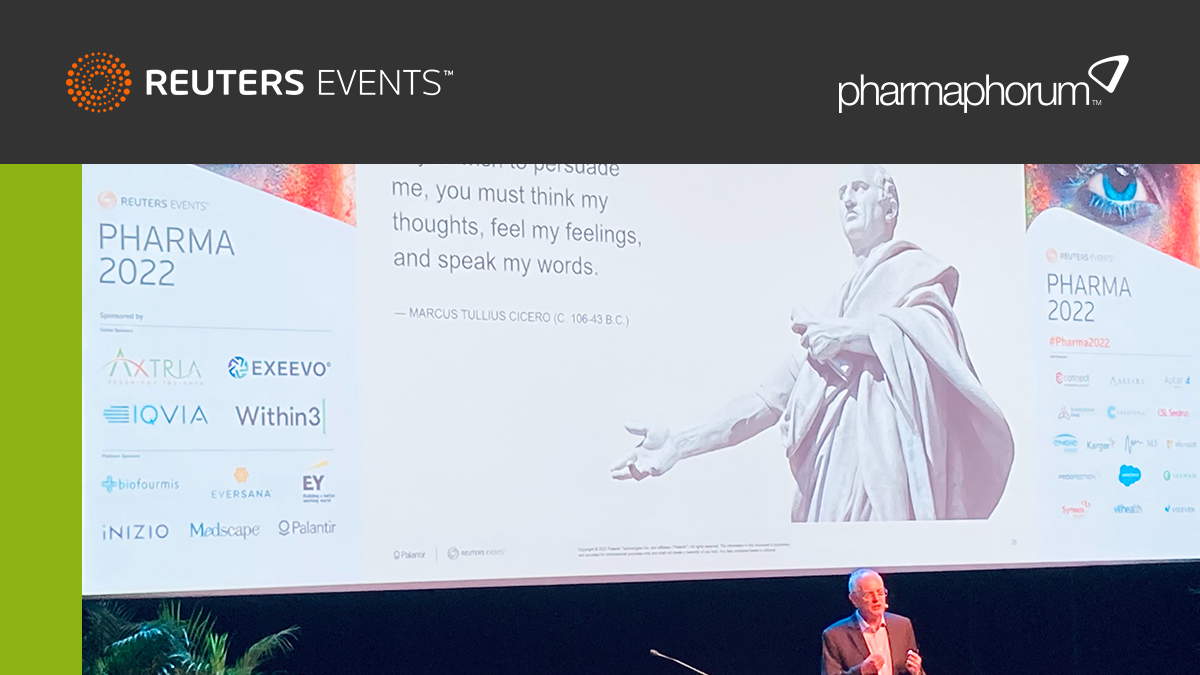Reuters Pharma 2022 - a day one overview - part 1

The Reuters Pharma event 2022 began as a bustling industry affair yesterday, based out of the Nice Acropolis convention centre on France’s balmy south coast. With speakers gathered from a broad range of departments across the sector, it was a day for listening and noting, but also exploring and even challenging. But, overall, the energy of Day One was both positive - and digitally progressive.
Kicking off with the opening keynote by the director of Reuters events, Matt Atkinson, what is known as the ‘blue room’ was well-peopled with the keen eared for the first speakers of the day. Atkinson’s introduction noted that the event entire was to be that for a “new era” and that it would example the “acceleration across workstreams” that has been taking place, all with patient centricity at the core. The onus, he said, was on pharma to listen now.
Patient engagement – what history teaches us about pharma’s future evolution
Given that Teva’s Kåre Schultz had been stuck in city traffic, it was instead Axtria’s Jaswinder Chadha, the company’s president and CEO, who spoke first, on the topic of patient engagement.
Talking his audience through a speedy historical meandering from early 8th century Baghdad apothecaries – with their own compounds and limited tools – through to the modern industrialisation and scaling (and progress) of pharma, Chadha noted that, although there had been a doubling of life expectancy in the past 100 years, patient engagement has become secondary to profits.
Instead, what is required now is a ‘patient 360’, wherein treatment is customised to a patient’s biology. Nonetheless, still, he said, the industry is doing little to access the necessary information for a post-treatment patient-first approach. And that “patient-first culture” requires a patient engagement strategy.
Closing with advice that such mapping of the patient must start pre-clinically and include patient lifestyle data, he noted that it is a direction which requires not just digital and indirect proximity, but physical proximity, also.
And the ultimate goal in an industry in which “the ultimate consumption is by the patient”? A one-on-one approach.
Chadha left the audience with a key Steve Jobs quote:
“Get closer than ever to your customers. So close that you tell them what they need before they realise it themselves.”
The Importance of ESG at Teva Pharmaceuticals
By the time Chadha had finished, Schultz (Teva’s president and CEO) had arrived at the centre and was ready to take listeners through Teva’s perspective on environmental, social, and governance (ESG). The patient, he said, is the most important part of that.
Talking through their generic medicines, of which the company has more than 1,000 projects ongoing, Schultz noted that more than half of the leading medicines on the WHO’s list of medicines are Teva’s. Indeed, of the 281 WHO-listed essential medicines, 100% of respiratory treatments are Teva’s. The purpose of these? In case it needed re-stating: to help patients.
Generics, of course, are not just a Teva thing. So, Schultz specified what was, delving in particular into the company’s environmental endeavours, reducing energy and raw materials consumption and moving from what he called ‘black energy’ to green energy, enacting a “perfectly ordinary” reduction in GHGs over the past five years.
Socially, Schultz explained that Teva is currently implementing projects to “serve underserved populations” with treatments and healthcare training – such as on the African continent (Malawi, Botswana, Uganda), where regulatory approval of elsewhere-approved drugs is not always followed through with – but also take treatments to the minorities within wealthier countries, such as France and the US. Stating this might not be “good business”, nevertheless, increasing access to treatments was, he said, “good healthcare”.
Currently, the company is focusing on childhood cancer in Africa, mental health in the US, taking healthcare to immigrants in France and to the status-less in Israel. Teva is also branching out such social action into Eastern Europe.
Becoming a disruptor: unearthing Sanofi’s digital potential
Arnaud Robert, chief digital officer at Sanofi, took to the stage after that (still within the centre’s blue room), and talked the audience through data transparency, which he termed “a cultural moment for a company”.
Looking more closely at innovation at scale – that is, digital innovation – Robert ran through the company’s OneAI, OneSearch, and OneView. OneAI permits, he said, 100 times faster protein modelling and 600 times faster digital bio-imaging. It takes a potentially 11-month long human process down to a single day or even two hours. Similarly, OneSearch can run through millions of records more than a human eye ever could in a week, while OneView provides an analytical tool for a changing industry scene. In the next 10 years, he said, 50% of everything will be driven by AI data.
Of course, as was the theme of Day One, patient centricity was touched upon: “We don’t talk about it enough, in my humble opinion,” Robert said. Mentioning Sanofi’s close work with Owkin at the moment, he rhetorically questioned whether companies wanted to be patient centric or, rather, human centric.
Maximising potential, inspiring in pharma
Claire D’Abreu-Hayling, CSO at Sandoz (A Novartis division) directed audience focus not only to ways of increasing access to medicines for patients, but also to diversification of the pharma industry itself as a first port of call, stating that diversity is not just a concept for clinical trials, but for the workplace also.
Dubbing this notion “innovation from a people perspective”, D’Abreu Hayling ran the audience through acquired diversity and inherited diversity, as well as 2-dimensional diversity, believing that C-suite intention and innovation should be part of ESG, also.
Water water everywhere, nor any drop to drink: why it will take more than data to drive innovation
Chief medical officer at Palantir Technologies, Dr William Kassler’s fascinating talk betrayed a fervent literary vein beneath the surface, as the former epidemiologist pointed out the comparisons between Samuel Taylor Coleridge’s famous poem ‘The Rime of the Ancient Mariner’ – with its albatross good omen bird misinterpreted as a sign of malintent – to the challenging times for biopharma.
Running through the cost pressures for affordable projects, the increase in regulatory hoops, and the unrealised potential of AI – Kassler noted a current state of having been “becalmed in a sea of data”, wherein a single person equates to 12 terabytes of data (which is equivalent to 300,000 copies of Tolstoy’s epic “War and Peace”, didn’t you know).
Stating that ‘Data Commons’ conversations should not be regarding it as just a propriety resource, but as a general social good, Kassler called for a circumvention of “blocking”, of “ownership” of data by various bodies. Deeming this junctural moment in time as being the stage of “the stethoscope of the 21st century”, he urged the audience to understand that “data has no power to stir the soul”, rather, he said: “It’s not about the data, it’s about the human ethic.”
Kassler closed with a key Ciceronian slide quote:
“If you wish to persuade me, you must think my thoughts, feel my feelings, and speak my words.”
*NB: Part 2 of ’Reuters Pharma 2022 – a day one overview’ will follow shortly…













